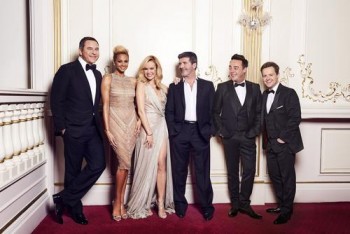
On 26 October, the production team behind the BAFTA-winning series discussed how to create a winning formula for entertainment programming, and the challenges in maintaining the popularity of such a long running programme.
We asked the chair of the panel, Boyd Hilton, to share some of his highlights of the evening.
It may have been the night of the Great British Bake Off final, but that didn’t stop a good crowd coming to see Britain’s Got Talent Exec Producer Clair Breen and Series producer Charlie Irwin share their expertise on how to put together the biggest entertainment show on British television.
It was also a chance for me to grill the producers on what is often regarded as a rather mysterious and even secretive process: how exactly do they find the acts to fill such a massive series? In fact, the answer was remarkably simple – by any and every means. BGT is unusual among TV talent shows in having almost no rules of entry whatsoever. Anyone can try their luck in the audition process – amateurs, professionals, young and old, individuals and groups; anyone of any age can do anything. Clair explained that the process of finding the acts has evolved over the years. Back when the show started 10 years ago, they mostly relied on people queuing up for open audition days. Now they still have tens of thousands of people applying, but the producers use all kinds of methods to sift through them, including watching video performances online, as well as pro-actively scouring all kinds of sources like YouTube and foreign talent shows. They have scouts going out and about with expertise in specific areas like magic, comedy, dance and circus performers, and they also organise ultra-local talent nights for those who can’t make it to the big cities. Singer Calum Scott, who got through to the final in 2015, was discovered at one of these intimate audition nights in Hull.
Charlie and Clair were also at pains to emphasise that casting the show is the single most important aspect of the whole process. Their dream booking is someone doing something “unique”, with Clair using the example of Alex Magala who terrified everyone in 2015 with his sword-swallowing routine up a massive pole, as a prime example. “We’re always pushing the casting team to find something which will surprise our audience,” she said. “A twist on what we might have seen before.” A clip of Magala’s act from the live semi-finals involving a chainsaw showed that he still has the power to shock. A member of the audience asked a pertinent question about casting: did they deliberately seek out “bad” acts? Clair explained that they don’t set out to belittle anyone, but that “eccentric” performers were always part of the show’s mix, and Charlie used the example of Stavros Flatley to explain that an act might be peculiar but they can still end up as one of the show’s most iconic turns.
The discussion moved on to the importance of the BGT judges and presenters. It isn’t exactly controversial to observe that Ant and Dec, hosts from the start, are the best in the business, but Clair and Charlie did point out how key they are to the success of the show. They act as the audience’s surrogate, free to interact with the auditionees in any way they see fit, often adding to the show’s general air of freewheeling anarchy. A clip was shown of the boys encouraging comb-playing musician Narinder from series nine, who initially faced resistance from the judges but the presenters joined in on their own combs and won both the audience and judges round.
As for the judging team, Clair was absolutely clear that this current line-up of Simon Cowell, David Walliams, Amanda Holden and Alesha Dixon, was her dream team, and that they don’t see any reason to change it up despite this line-up being stable for five years now. Even BAFTA Special Award winner Simon Cowell is happy and is not in favour of change just for the sake of it, they explained. A clip of Walliams dressing up as Cowell from the last series showed the kind of joyous irreverence that David has brought to the show. The producers did admit Simon is a maverick when it comes to time keeping, arriving hours later than the rest of the team for the audition sessions, so much so that they’ve now just given in and put the whole recording schedule back to cater for his idiosyncratic hours.
Finally, I was intrigued to find out how the producers keep such an iconic and long-running show feeling fresh and vital. They key factors are variety, warmth and comedy and ever-evolving production values. These days there’s much more very specifically produced “reality” in each audition shows, where we get to see the acts chatting among themselves as well as audience members and behind-the-scenes footage of the judges. It’s all a far cry from the early days when Ant and Dec would simply introduce the acts, and that was pretty much it.
BGT is now a fully-fledged lavish televisual extravaganza. It’ll be intriguing to see what the producers have in store for Series 11.





